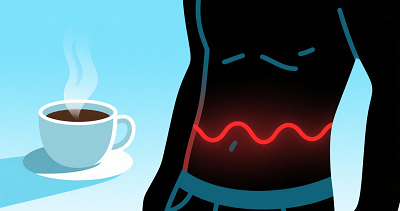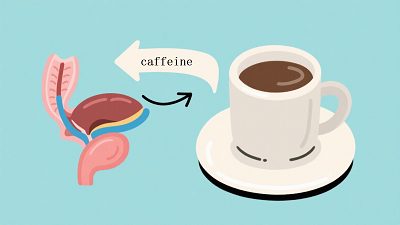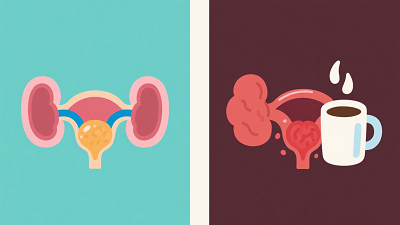Why Does My Chronic Prostatitis Pain Flare Up After I Drink Coffee?
Picture this: You're having a good morning, feeling relatively comfortable despite your chronic prostatitis. You brew your favorite cup of coffee, take that first satisfying sip, and within an hour or two, you're dealing with familiar pelvic pain, burning sensations, and an urgent need to urinate. Sound familiar? If you're nodding your head, you're not alone in this frustrating experience.

The relationship between coffee and chronic prostatitis symptoms isn't just in your head – it's a well-documented medical phenomenon that affects countless men worldwide. Understanding why this happens can help you make informed decisions about your daily habits and potentially reduce the frequency and intensity of your symptoms.
The Coffee Culprit: It's Not Just About Caffeine
When most people think about coffee's effects on the body, caffeine immediately comes to mind. And while caffeine plays a starring role in triggering prostatitis symptoms, it's not the only villain in your morning cup. Coffee is actually a complex mixture of hundreds of compounds, many of which can irritate your urinary system and potentially inflame your already sensitive prostate area.
Caffeine's Direct Impact on Your Bladder
Research shows that caffeine intake of 2 or more cups of coffee can make overactive bladder symptoms worse, and four or more cups can cause symptoms in people who don't even have a diagnosis of bladder problems. But what exactly does caffeine do to your system?
Studies have found that even a relatively small dose of 4.5 milligrams of caffeine had a diuretic effect, increased urine flow speed, and increased the volume of urine produced. For someone already dealing with chronic prostatitis, this triple effect can be particularly troublesome.
Think of your bladder as a sensitive alarm system that's already on high alert due to your prostatitis. Caffeine essentially turns up the sensitivity of this alarm system, making it more likely to trigger urgency, frequency, and discomfort. The increased urine production means more pressure on your bladder, while the faster flow can create irritation as it passes through inflamed tissues.
The Hidden Acids in Your Cup
Here's something that might surprise you: even decaffeinated coffee can irritate the urinary tract because coffee contains various acids that can cause bladder discomfort and pain, particularly in men who are prone to urinary tract issues. These acids include:
Chlorogenic Acids: These give coffee its distinctive flavor but can irritate sensitive bladder and prostate tissues.
Quinic Acid: Formed during the roasting process, this compound can increase acidity in your system and potentially trigger inflammatory responses.
Caffeic Acid: Despite its name, this acid is present even in decaf coffee and can contribute to tissue irritation.
These acids don't just pass through your system harmlessly. When you're dealing with chronic prostatitis, your pelvic region is already in a state of heightened sensitivity. The introduction of these irritating compounds can tip the balance from manageable discomfort to active pain.

Understanding Your Body's Inflammatory Response
Chronic prostatitis, particularly the non-bacterial type (CP/CPPS), involves complex inflammatory processes that we're still learning about. The etiology of CP/CPPS was traditionally thought to be primarily due to inflammation and infection, but recently psychological factors, immune system, nervous system, and endocrine system disorders have been recognized in addition to inflammation.
When you consume coffee, several things happen simultaneously:
The Cascade Effect
Your body's inflammatory pathways can be triggered by dietary irritants like coffee. This doesn't mean coffee directly causes inflammation in everyone, but if you already have chronic prostatitis, your system is primed to react more strongly to potential irritants.
Muscle Tension and Sensitivity
Coffee's stimulating effects don't just wake up your mind – they can also increase muscle tension throughout your body, including in your pelvic floor muscles. For many men with chronic prostatitis, muscle tension in the pelvic region is a significant contributor to pain and discomfort.
Stress Response Amplification
Caffeine activates your sympathetic nervous system, essentially putting your body into a mild "fight or flight" mode. This stress response can exacerbate existing pain pathways and make you more sensitive to discomfort in your pelvic region.
The Individual Variation Factor
Not every man with chronic prostatitis will react to coffee in the same way. Some might notice immediate effects after just one cup, while others might be able to tolerate moderate amounts without significant symptoms. Several factors influence your individual response:
Your Baseline Inflammation Level
If you're currently experiencing a flare-up or your baseline inflammation is high, you're more likely to react strongly to coffee. During quieter periods of your condition, you might tolerate coffee better.
Overall Diet and Lifestyle
Men who follow an anti-inflammatory diet and maintain good hydration might have more tolerance for occasional coffee consumption compared to those whose overall diet is more inflammatory.
Genetic Factors
Your genetic makeup affects how quickly you metabolize caffeine and how sensitive you are to its effects. Fast metabolizers might clear caffeine from their system quickly, while slow metabolizers might experience prolonged effects.
Timing and Preparation Method
The time of day you drink coffee, whether you consume it with food, and how the coffee is prepared can all influence its impact on your symptoms.
Beyond Coffee: Other Caffeinated Culprits
It's important to limit caffeine intake by avoiding not just coffee, but also tea and caffeinated beverages like soda and energy drinks. Each of these beverages presents its own challenges:
Black and Green Tea: While generally containing less caffeine than coffee, teas also contain tannins that can irritate the bladder.
Energy Drinks: These often contain much higher caffeine levels than coffee, plus additional stimulants that can amplify symptoms.
Soft Drinks: Caffeinated sodas can inflame your urinary tract and bladder, and the added sugars and artificial ingredients can contribute to inflammation.
Chocolate: Often overlooked, chocolate contains both caffeine and theobromine, which can have similar effects to caffeine.
The Timing Factor: When Coffee Hurts Most
Many men notice that their reaction to coffee varies depending on when they consume it and what else is happening in their lives. Understanding these patterns can help you make better decisions about coffee consumption.
Morning Vulnerability
Your cortisol levels are naturally highest in the morning, which means your body is already in a somewhat stressed state. Adding caffeine to this mix can amplify the stress response and make you more sensitive to pain and discomfort.
Empty Stomach Effects
Drinking coffee on an empty stomach increases the concentration of acids and caffeine that come into contact with your digestive system, potentially leading to stronger systemic effects.
Stress Compounding
If you're already dealing with work stress, relationship issues, or other life pressures, adding caffeine to the mix can compound these stress effects and make your prostatitis symptoms worse.
Practical Strategies: Living With (or Without) Coffee
Harvard Health notes that eliminating caffeine and alcohol may reduce irritation of the bladder and prostate, but for many coffee lovers, complete elimination feels impossible or unnecessary. Here are some practical approaches:
The Gradual Reduction Method
If you're a heavy coffee drinker, suddenly eliminating all caffeine can cause withdrawal headaches and irritability, which might actually increase your stress levels and worsen symptoms. Instead, try reducing your intake by one cup every few days.
Timing Optimization
Some men find they can tolerate coffee better at certain times of day. Experiment with different timing to see if drinking coffee earlier or later affects your symptoms differently.
Preparation Modifications
- Cold Brew: This method produces coffee with lower acidity levels, which might be less irritating
- Adding Milk or Cream: Dairy can help neutralize some of the acids in coffee
- Quality Matters: Higher-quality, freshly roasted beans often have fewer irritating compounds than stale or low-quality coffee
The Substitution Game
- Herbal Teas: Caffeine-free options like chamomile or ginger tea can provide warmth and comfort without irritation
- Decaf Coffee: While not perfect due to residual acids, it eliminates the caffeine component
- Chicory Coffee: A caffeine-free alternative that provides a similar bitter taste profile
Monitoring Your Personal Response
Keep a symptom diary for several weeks, noting:
- What you drink and when
- Symptom intensity and timing
- Other factors like stress levels, sleep quality, and diet
- Activities that seem to help or worsen symptoms
This information can help you identify your personal triggers and tolerance levels.
The Bigger Picture: Coffee as Part of a Comprehensive Approach
While coffee might be a trigger for your symptoms, it's important to remember that chronic prostatitis management involves multiple factors. Eliminating coffee alone is unlikely to cure your condition, but it might be an important piece of your overall management strategy.
Working with Healthcare Providers
Discuss your coffee consumption and symptoms with your healthcare team. They might recommend specific dietary changes or timing modifications based on your individual case and other treatments you're receiving.
Balancing Quality of Life
For some men, the social and psychological benefits of enjoying their morning coffee outweigh the potential symptom increases, especially if the effects are mild. Others find that eliminating coffee significantly improves their quality of life. Neither approach is wrong – it's about finding what works for your unique situation.

Integrating Herbal Medicine for Long-Term Relief
In addition to dietary adjustments, some men with chronic prostatitis find that herbal therapies can help manage symptoms and prevent flare-ups. One well-regarded option in Traditional Chinese Medicine is the Diuretic and Anti-inflammatory Pill, a natural formula developed to clear heat, promote blood circulation, relieve pain, and improve urinary function.
This herbal approach addresses both the inflammation and microcirculatory issues often present in chronic prostatitis. By targeting the root causes rather than just relieving surface symptoms, it may help reduce recurrence risk over time. Clinical observations suggest that patients who combine lifestyle changes—such as moderating coffee intake—with consistent use of the Diuretic and Anti-inflammatory Pill often experience more stable symptom control and improved quality of life.
Looking Forward: Hope and Management
Understanding why coffee affects your chronic prostatitis symptoms is empowering. It means you have some control over at least one aspect of your condition. While chronic prostatitis can be frustrating and unpredictable, identifying and managing dietary triggers like coffee can be an important step in reducing symptom frequency and intensity.
Remember, chronic prostatitis affects everyone differently, and what works for one person might not work for another. Be patient with yourself as you experiment with dietary changes, and don't hesitate to seek support from healthcare providers who understand the complex nature of this condition.
Your morning routine doesn't have to be a source of dread. With careful attention to your body's signals and some strategic modifications, you might be able to find a balance that works for you – whether that means enjoying coffee in moderation, switching to alternatives, or discovering that elimination brings significant relief.
The key is paying attention to your body, tracking your symptoms, and making informed decisions based on your personal experience and medical guidance. Your prostatitis journey is unique, and finding the right dietary approach is just one part of reclaiming comfort and control in your daily life.



